Abstract
OBJECTIVE--To assess the proportion of acutely ill psychiatric patients who can be treated in a day hospital and compare the outcome of day patient and inpatient treatment. DESIGN--Prospective randomised controlled trial of day patient versus inpatient treatment after exclusion of patients precluded by severity of illness or other factors from being treated as day patients. All three groups assessed at three and 12 months. SETTING--Teaching hospital serving small socially deprived inner city area. Day hospital designed to take acute admissions because of few beds. PATIENTS--175 Patients were considered, of whom 73 could not be allocated. Of the remaining 102 patients, 51 were allocated to each treatment setting but only 89 became established in treatment--namely, 41 day patients and 48 inpatients. 73 Of these 89 patients were reassessed at three months and 70 at one year. INTERVENTIONS--Standard day patient and inpatient treatment. MAIN OUTCOME MEASURES--Discharge from hospital and return to previous level of social functioning; reduction of psychiatric symptoms, abnormal behaviour, and burden on relatives. RESULTS--33 Of 48 inpatients were discharged at three months compared with 17 of 41 day patients. But at one year 9 of 48 inpatients and three of 41 day patients were in hospital. 18 Of 35 day patients and 16 of 39 inpatients were at their previous level of social functioning at one year. The only significant difference at three months was a greater improvement in social role performance in the inpatients. At one year there was no significant difference between day patients and inpatients in present state examination summary scores and social role performance, burden, or behaviour. CONCLUSIONS--Roughly 40% of all acutely ill patients presenting for admission to a psychiatric unit may be treated satisfactorily in a well staffed day hospital. The outcome of treatment is similar to that of inpatient care but might possibly reduce readmissions. The hospital costs seem to be similar but further research is required to assess the costs in terms of extra demands on relatives, general practitioners, and other community resources.
Full text
PDF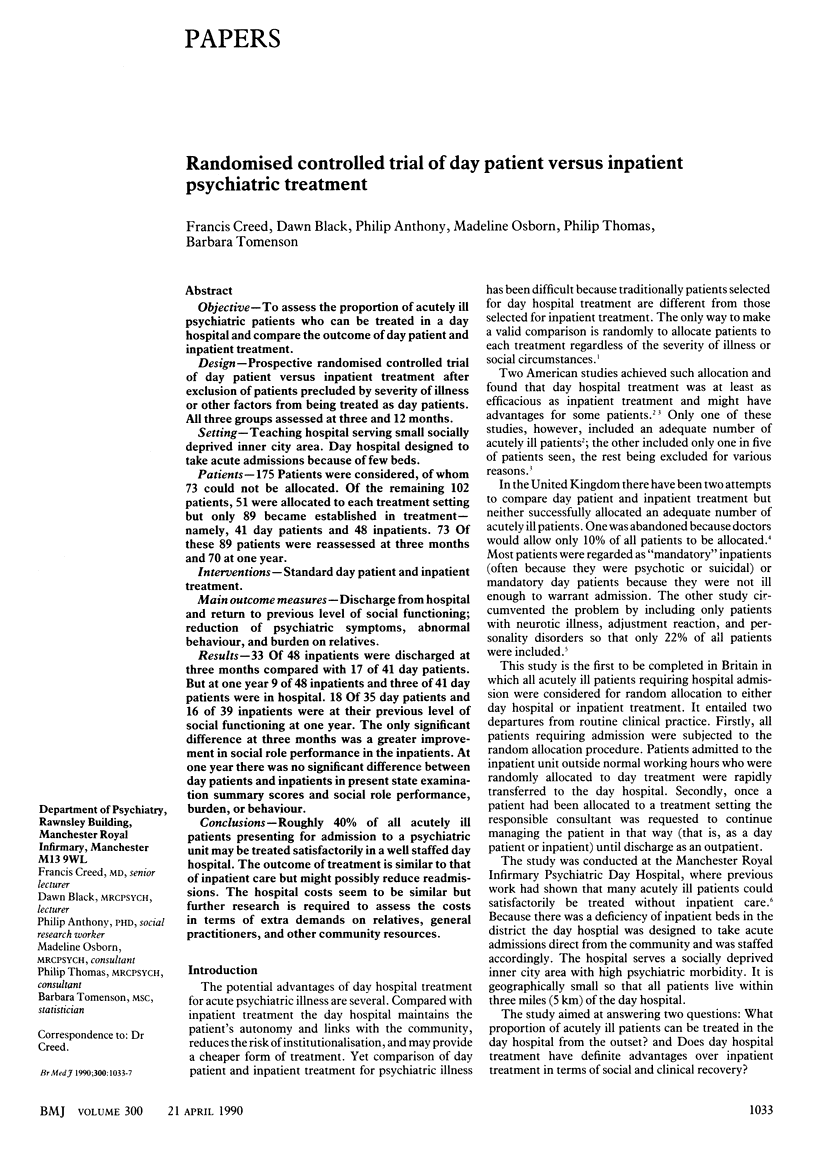
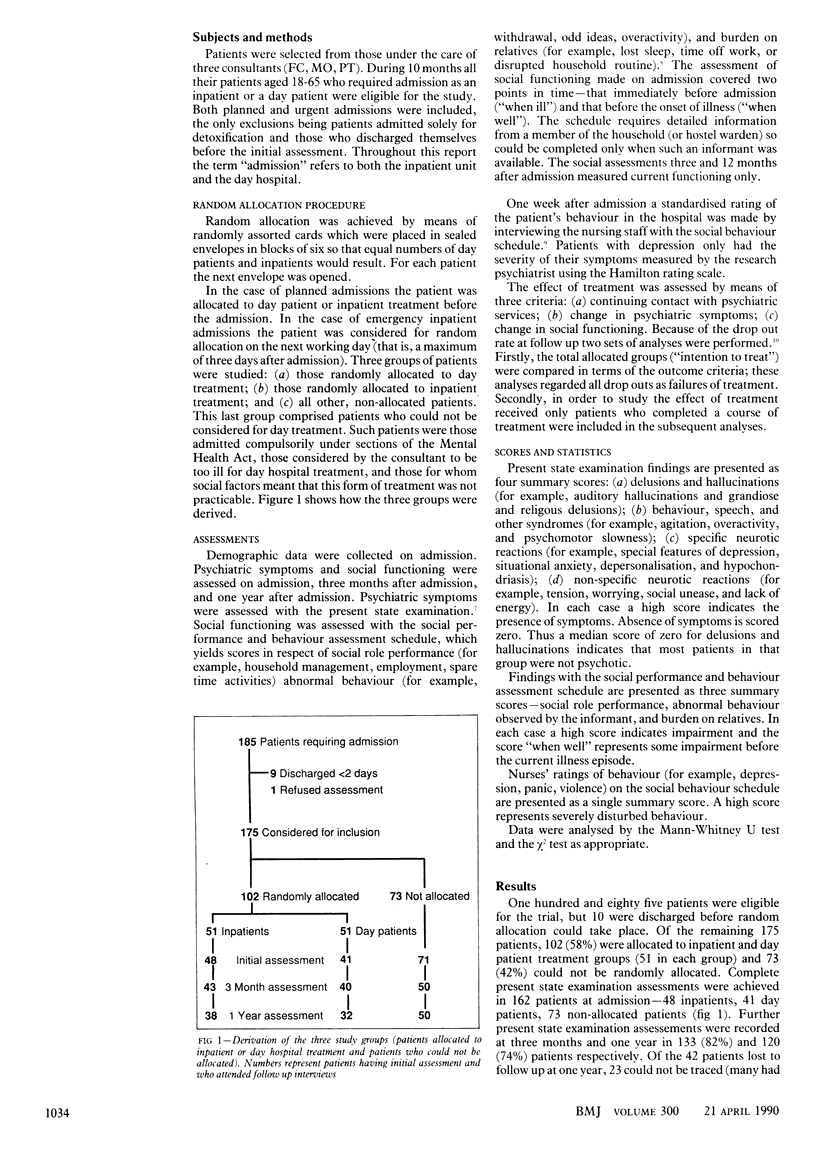
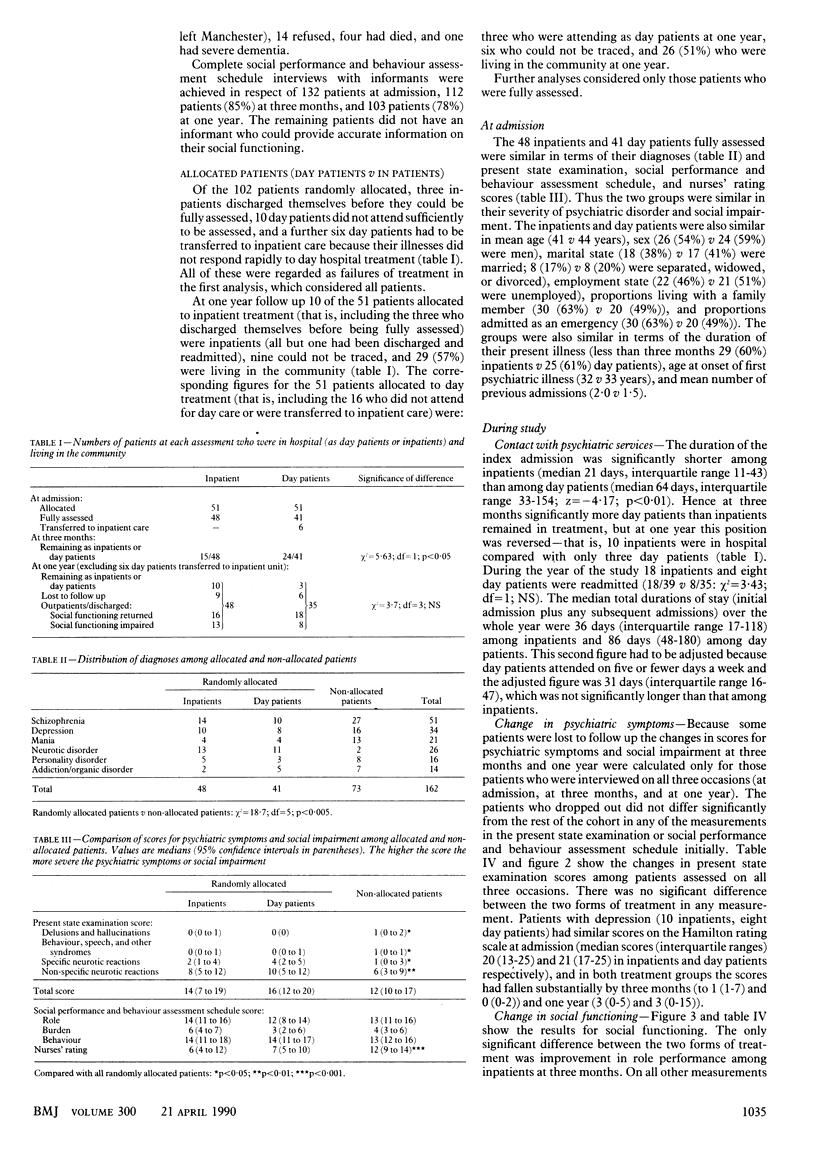
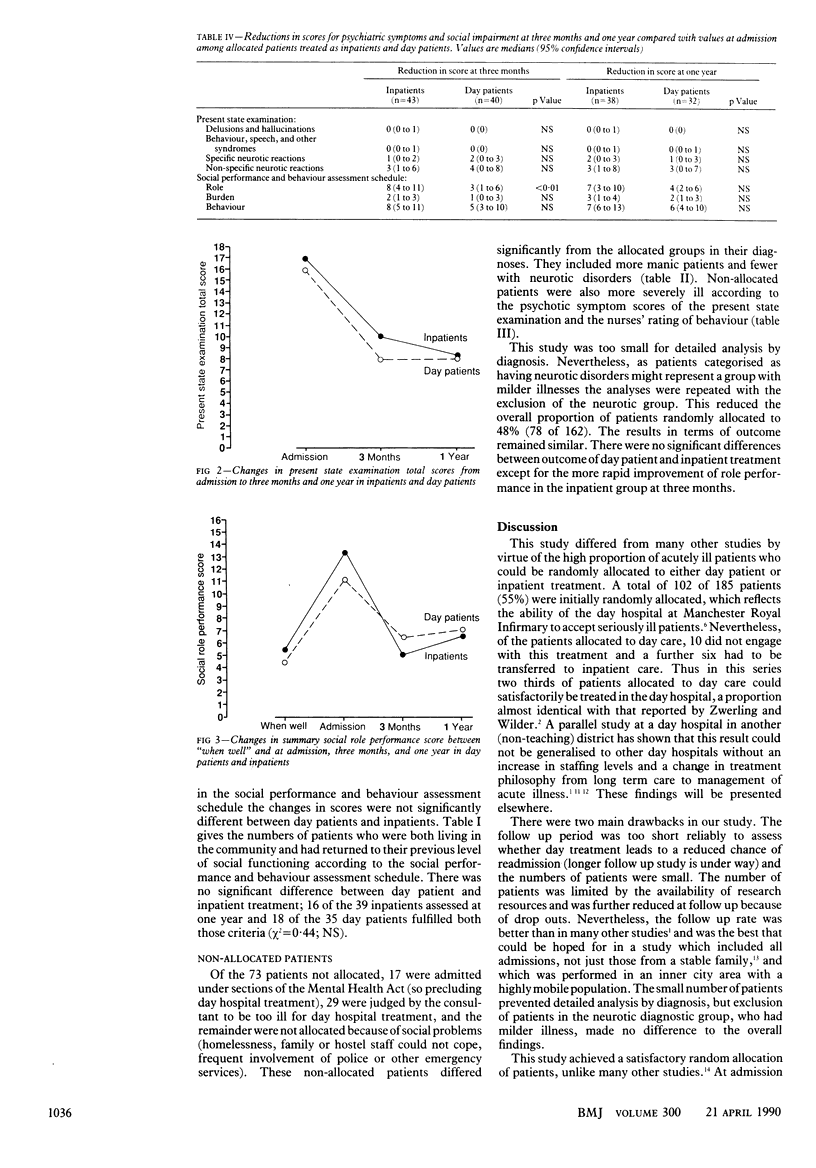
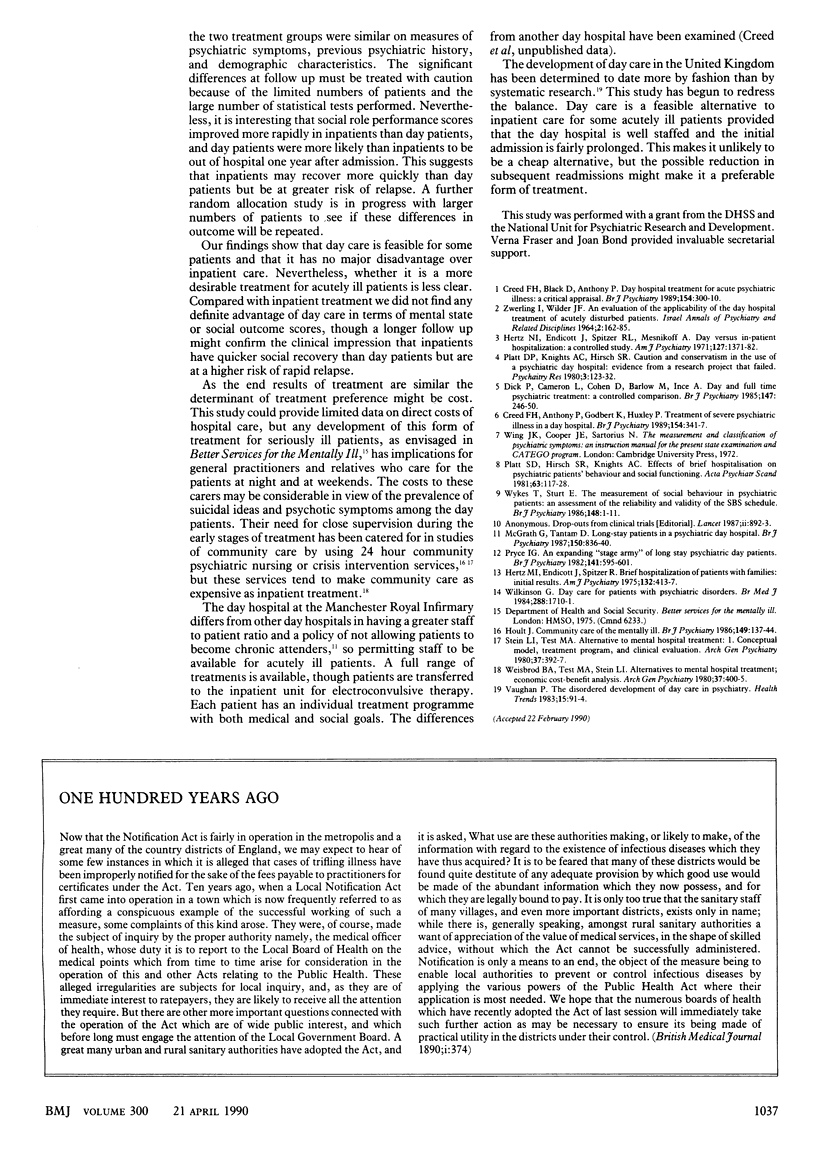
Selected References
These references are in PubMed. This may not be the complete list of references from this article.
- Creed F., Anthony P., Godbert K., Huxley P. Treatment of severe psychiatric illness in a day hospital. Br J Psychiatry. 1989 Mar;154:341–347. doi: 10.1192/bjp.154.3.341. [DOI] [PubMed] [Google Scholar]
- Creed F., Black D., Anthony P. Day-hospital and community treatment for acute psychiatric illness. A critical appraisal. Br J Psychiatry. 1989 Mar;154:300–310. doi: 10.1192/bjp.154.3.300. [DOI] [PubMed] [Google Scholar]
- Dick P., Cameron L., Cohen D., Barlow M., Ince A. Day and full time psychiatric treatment: a controlled comparison. Br J Psychiatry. 1985 Sep;147:246–249. doi: 10.1192/bjp.147.3.246. [DOI] [PubMed] [Google Scholar]
- Herz M. I., Endicott J., Spitzer R. L. Brief hospitalization of patients with families: initial results. Am J Psychiatry. 1975 Apr;132(4):413–418. doi: 10.1176/ajp.132.4.413. [DOI] [PubMed] [Google Scholar]
- Herz M. I., Endicott J., Spitzer R. L., Mesnikoff A. Day versus inpatient hospitalization: a controlled study. Am J Psychiatry. 1971 Apr;127(10):1371–1382. doi: 10.1176/ajp.127.10.1371. [DOI] [PubMed] [Google Scholar]
- Hoult J. Community care of the acutely mentally ill. Br J Psychiatry. 1986 Aug;149:137–144. doi: 10.1192/bjp.149.2.137. [DOI] [PubMed] [Google Scholar]
- McGrath G., Tantam D. Long-stay patients in a psychiatric day hospital. A case note review. Br J Psychiatry. 1987 Jun;150:836–840. doi: 10.1192/bjp.150.6.836. [DOI] [PubMed] [Google Scholar]
- Platt S. D., Hirsch S. R., Knights A. C. Effects of brief hospitalization on psychiatric patients' behaviour and social functioning. Acta Psychiatr Scand. 1981 Feb;63(2):117–128. doi: 10.1111/j.1600-0447.1981.tb00658.x. [DOI] [PubMed] [Google Scholar]
- Platt S. D., Knights A. C., Hirsch S. R. Caution and conservatism in the use of a psychiatric day hospital: evidence from a research project that failed. Psychiatry Res. 1980 Oct;3(2):123–132. doi: 10.1016/0165-1781(80)90029-3. [DOI] [PubMed] [Google Scholar]
- Pryce I. G. An expanding 'stage army' of long-stay psychiatric day-patients. Br J Psychiatry. 1982 Dec;141:595–601. doi: 10.1192/bjp.141.6.595. [DOI] [PubMed] [Google Scholar]
- Stein L. I., Test M. A. Alternative to mental hospital treatment. I. Conceptual model, treatment program, and clinical evaluation. Arch Gen Psychiatry. 1980 Apr;37(4):392–397. doi: 10.1001/archpsyc.1980.01780170034003. [DOI] [PubMed] [Google Scholar]
- Vaughan P. J. The disordered development of day care in psychiatry. Health Trends. 1983 Nov;15(4):91–94. [PubMed] [Google Scholar]
- Weisbrod B. A., Test M. A., Stein L. I. Alternative to mental hospital treatment. II. Economic benefit-cost analysis. Arch Gen Psychiatry. 1980 Apr;37(4):400–405. doi: 10.1001/archpsyc.1980.01780170042004. [DOI] [PubMed] [Google Scholar]
- Wilkinson G. Day care for patients with psychiatric disorders. Br Med J (Clin Res Ed) 1984 Jun 9;288(6432):1710–1712. doi: 10.1136/bmj.288.6432.1710. [DOI] [PMC free article] [PubMed] [Google Scholar]
- Wykes T., Sturt E. The measurement of social behaviour in psychiatric patients: an assessment of the reliability and validity of the SBS schedule. Br J Psychiatry. 1986 Jan;148:1–11. doi: 10.1192/bjp.148.1.1. [DOI] [PubMed] [Google Scholar]
- ZWERLINGI, WILDER J. F. AN EVALUATION OF THE APPLICABILITY OF THE DAY HOSPITAL IN TREATMENT OF ACUTELY DISTURBED PATIENTS. Isr Ann Psychiatr Relat Discip. 1964 Oct;2:162–185. [PubMed] [Google Scholar]


